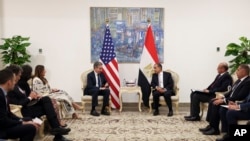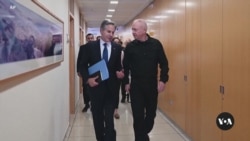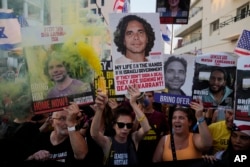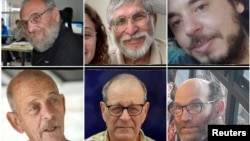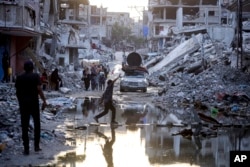U.S. Secretary of State Antony Blinken said in Tel Aviv late Monday that Israeli Prime Minister Benjamin Netanyahu had accepted an American “bridging proposal” on a Gaza cease-fire deal, and that it was up to Hamas to agree.
“It’s now incumbent on Hamas to do the same,” and then with the help of mediators Egypt, Qatar and the United States, to “come together and complete the process,” Blinken told reporters, without saying whether concerns cited by the Hamas militant group had been addressed.
Meanwhile, the Israeli military announced the bodies of six hostages had been recovered from Gaza.
Blinken's ninth visit to the Middle East since the Gaza war broke out in October 2023 came as the U.S., Egypt and Qatar sought to finalize a cease-fire and hostage-release deal between Israel and Hamas.
WATCH: Eyes on Hamas after Israel confirms support for proposal
After leaving Israel, Blinken headed to Egypt and Qatar for further negotiations.
The U.S. put forward a bridging proposal during last week’s cease-fire talks in Doha. Discussions are set to resume in Cairo this week. Blinken said even if Hamas accepts the deal, there are still “complex issues” requiring “hard decisions by the leaders.” He didn’t offer specifics.
“We’re never giving up,” said Blinken, when asked if time to take the deal could ultimately run out. He held a one-on-one meeting with Netanyahu for 2½ hours.
Some analysts were skeptical.
"I think there's a lot of wishful thinking going on, and I think the wishful thinking is because the stakes are now so high, because there is a potential for this conflict to escalate beyond its borders," Mirette Mabrouk, a senior fellow at the Middle East Institute, told VOA on Monday.
An Israeli government spokesperson told reporters on Monday that Netanyahu “stands firmly by the principle” that the Israel Defense Forces will maintain a physical presence in the Philadelphi Corridor — the border between Gaza Strip and Egypt — to prevent what they describe as the resupply of Hamas’ deadly weapons.
Earlier, Hamas accused Netanyahu of undermining the mediators’ efforts. Sami Abu Zuhri, a member of Hamas' political bureau, dismissed claims that signs of progress after two days of talks in Doha were “an illusion.”
There is an increased urgency to reach a deal amid fears of broader regional escalation if Iran and its Lebanese proxy, Hezbollah, retaliate against Israel for the assassination of a top Hezbollah operative in Beirut and Hamas political leader Ismail Haniyeh in Tehran.
Israel has claimed responsibility for the Beirut attack but not the Tehran one, although it is widely presumed to have carried it out.
Bodies of hostages returned
The bodies of six hostages, including five who were previously announced dead, were retrieved from Khan Younis in southern Gaza.
The military said it carried out the operation with internal security agency Shin Bet.
Among the bodies recovered was that of 79-year-old Abraham Munder, whose death was announced Tuesday by his kibbutz community.
Kibbutz Nir Oz called Munder’s death “murder,” saying he endured "physical and mental torture for months.”
The other hostages were: Yagev Buchshtab, 35, abducted with his wife, who was released after 50 days in captivity; Alexander Dancyg, 75; Yoram Metzger, 80, abducted with his wife, who was released after 53 days; Nadav Popplewell, 51, abducted with his mother, who was released after 49 days; and Chaim Perry, 80.
In a statement early Tuesday, the Hostages Family Forum said Israel “has a moral and ethical obligation to return all the murdered for dignified burial and to bring all living hostages home for rehabilitation.”
“The immediate return of the remaining 109 hostages can only be achieved through a negotiated deal. The Israeli government, with the assistance of mediators, must do everything in its power to finalize the deal currently on the table," the statement said.
Netanyahu offered condolences to the families and pledged that Israel “will continue to make every effort to return all of our hostages – the living and the deceased."
The six hostages were among 250 people abducted by militants who stormed the border on Oct. 7, killing some 1,200 people, mostly civilians. Israel’s counteroffensive has killed more than 40,000 Palestinians, most of them women and children, according to Hamas-controlled health authorities. The Israeli military says that death toll includes thousands of Hamas militants it has killed.
Polio threat
A planned polio vaccination campaign in Gaza is set to proceed later this month amid the growing threat of a reemergence of the virus.
"We've been working on a detailed plan to make sure that those who need to be vaccinated against it can get vaccinated,” Blinken said after meeting with Israeli Defense Minister Yoav Gallant on Monday.
The Israeli military agency responsible for Palestinian civilian affairs, known by its acronym COGAT, said it would continue to facilitate the entry of medical teams and vaccines against the polio virus.
COGAT said that since the beginning of the war, 282,126 vials of the polio vaccine, sufficient for 2,821,260 doses, have been sent to Gaza. In the coming weeks, an additional 60,000 vaccines will be delivered to vaccinate more than 1 million children.
The World Health Organization and UNICEF, the United Nations’ children’s agency, have called for a seven-day humanitarian pause in the conflict to allow for two rounds of vaccination campaigns planned for late August and September across the Gaza Strip.
Hamas said in a statement last Friday that it would support a seven-day truce to facilitate the vaccinations. This was separate from the latest American cease-fire proposal and separate from a permanent cease-fire that Hamas has demanded.
Polio was eliminated in Gaza 25 years ago. However, in July 2024, the poliovirus was detected in environmental samples from Khan Younis and Deir al-Balah, located in the south and center of Gaza. According to WHO, three children presenting with suspected symptoms of polio have since been reported in Gaza.
“Completing a successful polio vaccination campaign is quite challenging. The safe transport of vaccines in cold temperatures and the availability of fuel and communication networks are all essential for the success of the WHO/UNICEF-led campaign to vaccinate 650,000 children below the age of 8 years,” Zaher Sahloul, president of humanitarian group MedGlobal, told VOA.
“A cease-fire, or at the very least a humanitarian pause, is urgently needed to give this polio vaccination campaign a fighting chance,” said Sahloul, who added that MedGlobal’s clinics in Gaza were expected to participate in the polio vaccination campaign.
VOA’s Natasha Mozgovaya and Kim Lewis contributed to this report. Some information came from The Associated Press, Agence France-Presse and Reuters.




